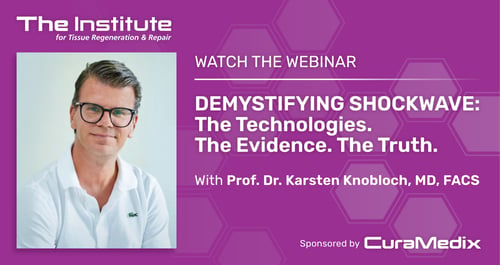Why Truth Matters When It Comes to Shockwave
Extracorporeal Shockwave Therapy (ESWT) is rapidly evolving across orthopedics, sports medicine, neurology, dermatology, and more. But as its use grows, so does the risk of confusion from non-scientific terminology and marketing-driven claims.
Understanding the science of Shockwaves is critical for physicians, medical professionals, and specialists in many fields. This knowledge is essential in selecting the right device and distinguishing between technologies that are backed by science and deliver measurable outcomes – and those that fall short.
 This was the focus of a recent Institute for Tissue Regeneration & Repair webinar sponsored by CuraMedix featuring Professor Dr. Karsten Knobloch, internationally renowned shockwave researcher, surgeon,and past-president of German-speaking DIGEST, vice president The International Society for Medical Shockwave Treatment (ISMST), fellow of the American College of Surgeons, and member of a number of different national and international societies. He has written seven medical textbooks with three on ESWT topics published by Level 10, and has been in private practice since 2012.
This was the focus of a recent Institute for Tissue Regeneration & Repair webinar sponsored by CuraMedix featuring Professor Dr. Karsten Knobloch, internationally renowned shockwave researcher, surgeon,and past-president of German-speaking DIGEST, vice president The International Society for Medical Shockwave Treatment (ISMST), fellow of the American College of Surgeons, and member of a number of different national and international societies. He has written seven medical textbooks with three on ESWT topics published by Level 10, and has been in private practice since 2012.
Webinar Insights: What You’ll Learn
Dr. Knobloch’s webinar provides clear, evidence-based answers to questions many medical professionals are asking:- How Shockwave evolved from high-energy lithotripsy to a regenerative, multi-specialty treatment.
- The differences between Focused Shockwave and Radial Pressure Wave, including depth, focal size, and optimal use cases, and how they are used optimally together
- The importance of generator type (electrohydraulic, electromagnetic, piezoelectric) and how this impacts focus size, energy delivery, and biological response.
- How to separate clinical reality from marketing hype and avoid costly missteps.
Shockwave Insight #1 – Device Engineering and Physics Shape Outcomes
Not all Shockwave devices are created equal. The 3 main focused generators include:- Electrohydraulic generators - introduced in 1980 used by SoftWave (MTS/TRT)
- Piezoelectric generators - introduced in 1985.
- Electromagnetic generators - introduced in 1985 (used by STORZ Medical) These different sources of focused shockwave directly influence clinical results and are fundamental to the science of shockwave.
Shockwave Insight #2 – Application and Approach has Evolved.
Today’s protocols now use low- to medium-energy waves to regenerate damaged tissue by:
- Stimulating angiogenesis (new blood vessel formation)
- Activating mesenchymal stem cells
- Modulating inflammatory cytokines
- Promoting extracellular matrix remodeling
Shockwave Insight #3 – Clinical Evidence in Action
Combining Focused Shockwave with radial pressure wave has been shown to successfully treat a range of issues to include:
- Peroneal tendinopathy
- Bony edema
- Trigger Finger
- Carpal Tunnel Syndrome
- Dupuytren’s disease
- Osgood Schlater
- Meniscal tears
- Medial knee ligament injuries
- And more
These real-world outcomes underscore why understanding the science of Shockwave is vital before integrating it into a treatment protocol.
Shockwave Insight #4 – Shockwave Industry Nomenclature
Commonly used names/terms used when referring to various forms of Shockwave in the U.S
- ESWT - Extracorporeal Shockwave Therapy
- EPAT(R) - Extracorporeal Pulse Activation Technology
- AWT - Acoustic Wave Therapy (for aesthetics)
- RPW - Radial Pressure Wave
- FSW - Focused Shockwave
- TPS - Transcranial Pulse Stimulation
Shockwave Insight #5 – Investment Costs and Factors to Consider
Before purchasing a Shockwave device, it’s important to review:
- Device price - initial investment
- Handpiece/probe - maintenance, repair, and replacement costs
- Noise - decibel measurement near the ear of the operator
- Regulatory compliance - research and papers to support the technology
Shockwave Insight #6: Beyond Musculoskeletal - Expanding Applications
Shockwave’s clinical reach is continually expanding and now includes:
- Neurology: MRI-guided focused Shockwave for concussion recovery and Alzheimer’s research
- Dermatology and Aesthetics: scar remodeling, cellulite reduction, wrinkle and fine line smoothing, skin rejuvenation
- Hair Restoration: stimulation of follicular activity for improved density
These new horizons reflect why Shockwave is reshaping non-invasive care.
Why You Should Watch the Webinar
View this information-packed webinar focused on science, evidence, and truth in order to:
- Gain clarity on the science of Shockwave and its regenerative mechanisms
- Learn how to distinguish high-quality, regulatory compliant devices from low-performing alternatives
- Understand the engineering differences that determine patient outcomes
- See practical case examples where evidence-based protocols delivered superior results

📍 Watch now
Bottom Line
Shockwave is more than a trending treatment; it’s a scientifically validated, precision-driven technology with applications far beyond its original from. However, results depend on informed device selection, protocol design, and a commitment to evidence-based practice.
Watching Dr. Karsten Knobloch’s presentation in this webinar is an opportunity to sharpen your expertise, differentiate your practice, and deliver optimal patient care grounded in the science of Shockwave.
Partnering with CuraMedix means you'll receive the customer service, tech support, education and training needed to help you integrate these technologies successfully and maximize ROI.
Have questions? Contact us today, and we'll connect you with one of the experts on our team.




